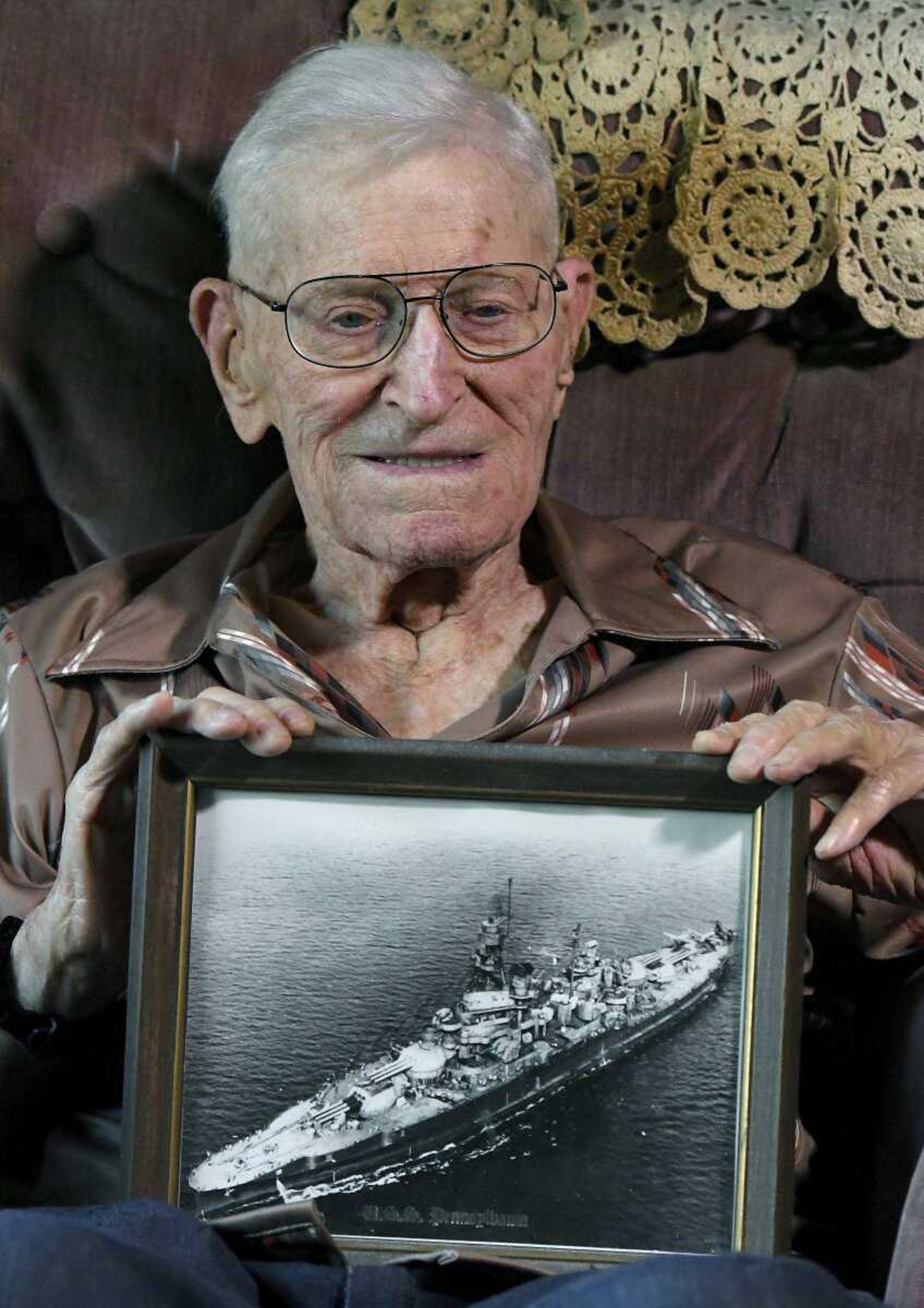Missouri man among last eyewitnesses to Pearl Harbor attack
INDEPENDENCE, Mo. -- Earl Wanbaugh was reading a magazine and waiting for the 8 a.m. presentation of colors on the battleship Pennsylvania when he heard the first explosion. He rushed on deck and saw the ship's band members racing toward him in panic and a Japanese plane flying low across the fantail. The surprise attack on Pearl Harbor had begun, 75 years ago Wednesday...
INDEPENDENCE, Mo. -- Earl Wanbaugh was reading a magazine and waiting for the 8 a.m. presentation of colors on the battleship Pennsylvania when he heard the first explosion.
He rushed on deck and saw the ship's band members racing toward him in panic and a Japanese plane flying low across the fantail. The surprise attack on Pearl Harbor had begun, 75 years ago Wednesday.
Wanbaugh, now 98 and one of the last remaining eyewitnesses, remembers it vividly.
"The plane wasn't much higher than this house," he said in his ranch-style home in Independence. "He flew across our stern and dropped that torpedo ... and hit the (cruiser) Helena. Then I saw this spurt of water go up when the torpedo exploded."
The attack literally had come out of the blue.
"It was hard to believe that it was happening," Wanbaugh said. "But they sounded over the speaker to man your stations. This was not a drill."
Wanbaugh was a gunner's mate, or "rammerman," whose job was to load 3/4-ton shells into the ship's 14-inch guns. They were not useful against torpedo planes and bombers, but there were other things to do over the next couple of hours.
The Pennsylvania was in dry dock along with the destroyers Cassin and Downes. The Downes had been hit, and both were on fire. The dry dock was deliberately flooded so the Pennsylvania's pumps could draw water to fight the fire. Wanbaugh was tasked to help with that and was on the dock when the Shaw, another destroyer in a nearby dry dock, exploded.
"It caught me out in the open, and I ran to get in behind a cement-block building because I was just sure that shrapnel was going to come over at me," Wanbaugh said.
He quickly got back on board the Pennsylvania, where he watched eruptions in the water as a Japanese plane made a strafing run against an unprotected tugboat that was pulling the minelayer Oglala from the stricken Helena. He hurried to get inside the battleship's big-gun turret for safety, and he heard an even louder explosion.
"It turned out to be a bomb they had dropped on the Pennsylvania, on the starboard side, and it killed 18 people."
Wanbaugh was 23 years old and had enlisted in the Navy two years earlier, seeking something steady after a young life as a sharecropper. He hadn't been expecting this. Suddenly, on a Sunday morning, there was chaos everywhere.
"Ford Island was on fire. The (battleship) Oklahoma was rolled over. The (battleship) Arizona had been hit and was burning furiously. There were fellows in boats running around in the harbor. I could tell they were picking up the dead and wounded. Oil from the Arizona was in the harbor and was on fire. They were snaking these guys out of that fire and oil."
Wanbaugh was among Pearl Harbor veterans invited by the Pacific Fleet command to attend the 75th anniversary observance of the attack that drew the United States into World War II, but he declined. He had vowed long ago never to return to Hawaii.
But he's got memories he's kept pure by refusing to see movies such as "Tora! Tora! Tora!" that could muddy them.
Wanbaugh's favorite souvenir is a typed "Orders For the Day" for Dec. 7 he took off a bulletin board on the Pennsylvania. It's creased and taped up and framed. The movie that day was to be "Lady Be Good" with Eleanor Powell and Ann Sothern, but the crew never got to see it.
Thinking back to Pearl Harbor, Wanbaugh said things did not calm down after the all-clear finally was sounded.
"After the attack, everybody was jumpy," he said. "About 1 in the morning, they got us out of bed and issued us .30-06 rifles and told us the Japs were landing around the harbor entrance. I recall taking the gun and thinking, 'I never killed anybody. I don't want to kill anybody, but if I see a Jap over the top of this gun, I'm going to kill him.'"
But there were no Japanese landing, he said. "We never left the ship. It was just a false alarm."
The Pennsylvania shipped out for home a week after the attack, but the crew remained jittery. When a mess table that had been suspended near the ceiling for storage fell with a bang to the floor, the startled sailors raced to their battle stations. The same thing happened when the battleship reached San Francisco and the heavy anchor chains rattled across the deck.
The Pearl Harbor attack was the first and last time Wanbaugh saw action. He later was trained in the use of a new generation of anti-aircraft guns and became an instructor stateside. Two of his brothers served in the Navy in the Pacific, and another was in the Army in Europe. They all returned home without a scar.
Wanbaugh paused when asked what the battle cry "Remember Pearl Harbor!" should mean three-quarters of a century later.
"If people would just remember one thing," he said, "that it could happen again. Maybe not (Japan), we don't know. But be prepared. Be more prepared than we were when it happened."
Connect with the Southeast Missourian Newsroom:
For corrections to this story or other insights for the editor, click here. To submit a letter to the editor, click here. To learn about the Southeast Missourian’s AI Policy, click here.










